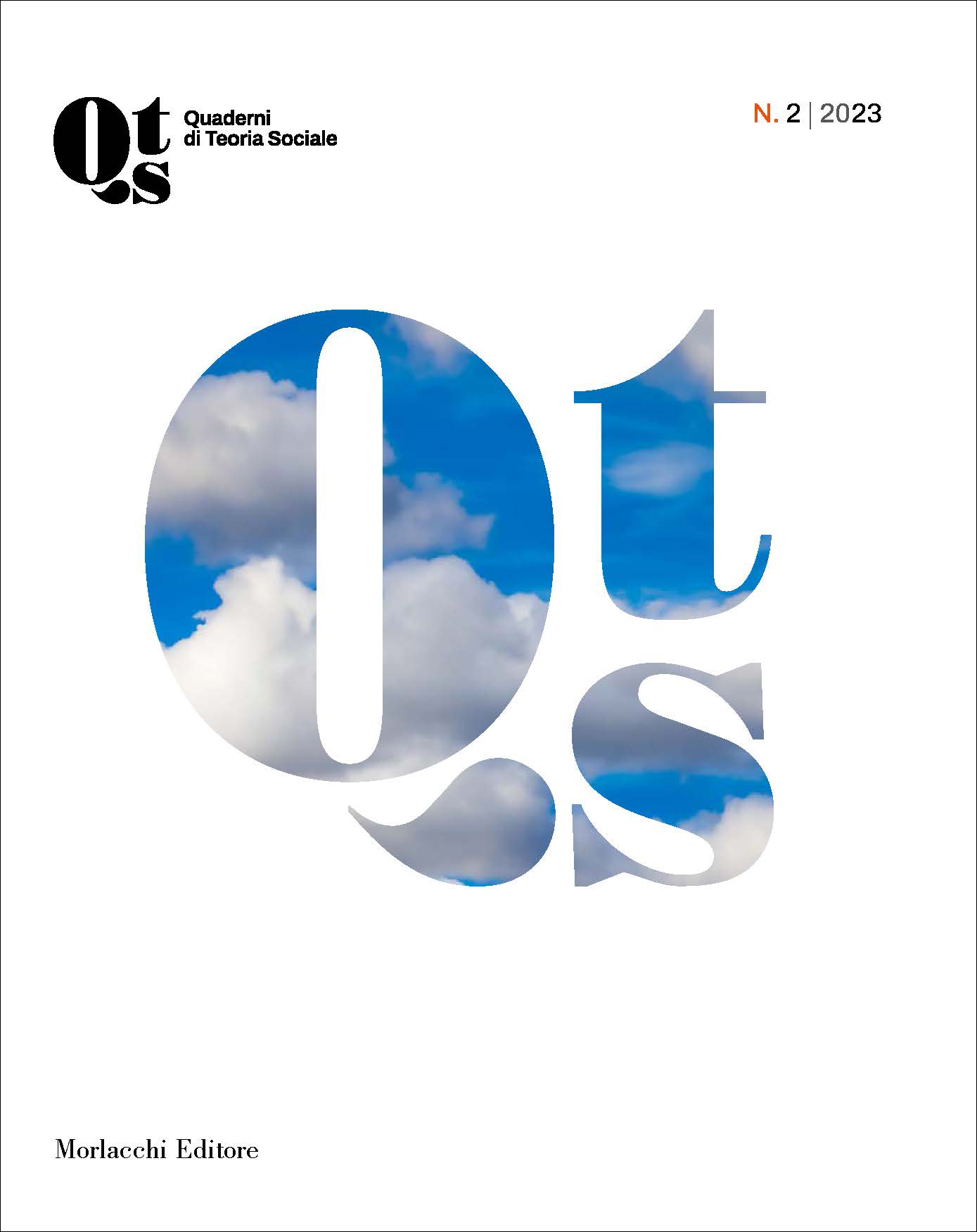Intersubjectivity, Empathy and Community. A dialogue with Dan Zahavi
DOI:
https://doi.org/10.57611/qts.v2i2.300Parole chiave:
Zahavi, Phenomenology, Self, Intersubjectivity, Empathy, SocialityAbstract
Dan Zahavi, born in Copenhagen in 1967, is one of the major scholars of Edmund Husserl’s philosophy and one of the most eminent thinkers of contemporary phenomenology. He studied Philosophy at the University of Copenhagen where he currently teaches. In 1994 he obtained his PhD at the Katholieke Universiteit in Leuven with a thesis on Husserl’s theory of transcendental intersubjectivity, under Rudolf Bernet’s supervision. His speculative itinerary begins with a study of “self” and “self-awareness” in which he defends the account of a minimal notion of the self. Starting from this perspective, Zahavi investigates the structures of intersubjectivity developing a broad reflection on the concept of empathy (1999, 2014). This line of research leads him to question the phenomenological status of collective experiences, shared and social emotions, and investigate the relationship between the individual and the community. In approaching these themes, Zahavi recognizes Husserl’s thought as the theoretical horizon to draw on for clarifying some key notions such as consciousness, collective intentionality, personalities of higher order, empathy, and community. Zahavi’s approach to the Husserlian philosophy has promoted a significant renewal of its interpretations through the valorization of some lesser-known aspects of Husserl’s works and manuscripts. Indeed, Zahavi is the author and editor of numerous works centered on the father of phenomenology (Zahavi 2002, 2017, 2018) and on the promotion of other lesser-known figures of the phenomenological scene, with particular attention to the thinkers of the so-called first-generation of phenomenologists. His work offers a wide-ranging overview of orientations and developments of the Husserlian and post-Husserlian phenomenological thought. Zahavi’s books, translated into numerous languages, make him an essential reference not only for specialists but also for scholars of other fields interested in these themes or exchanges with phenomenology. Alongside this line of research, the Danish philosopher has also developed a broad interest in other disciplinary perspectives which can shed light on different aspects of some nodal points of his thought: consciousness, intersubjectivity, and different forms of community. From this point of view, the author is often confronted with new trends in the fields of cognitive science, psychology, psychiatry, sociology, and anthropology, making them interact with his own philosophical and phenomenological perspective. In 2002, Zahavi was among the founders of the Center for Subjectivity Research (CFS) at the University of Copenhagen whose aim is to promote an interdisciplinary investigation of subjectivity and its bounds with others and the world. In its first twenty years of activity, the Center has worked on topics such as disorders of the self, perception, imagination, embodiment, empathy, and normativity, encouraging dialogue between different fields in order to investigate these phenomena in their complexity. Since 2020, the Center has been engaged in a five-year project entitled Who are we? Self-identity, social cognition, and collective intentionality that proposes to challenge one of the main criticisms often lobbied against phenomenology: its inability to carry an analysis of the collective phenomena out due to its first-person perspective. Coherently with Zahavi’s philosophical and investigative posture, this research is conducted through the rehabilitation of some concepts of Husserlian philosophy, and more generally of phenomenology, and through dialogue with other disciplines. The project therefore intends to deepen the perspective of the first-person plural focusing on collective identities, collective intentionality, and on the different forms of participation by questioning how these elements interact with individuals and their experiential perspective. The project addresses the important implications that these questions, in particular the tension between individuals and communities, have on a political level by trying to provide hermeneutic tools and insights for research in the socio-political field.
Riferimenti bibliografici
Habermas, J., 1992, Postmetaphysical Thinking: Philosophical Essays, Polity Press, Cambridge (or. ed. 1988).
Hochschild, A., 2016, So How’s the family and other essays, University of California Press, Berkeley.
Husserl, E., 1977, Cartesian Meditations: an introduction to phenomenology, Martinus Nijhoff, The Hague (or. ed. 1931).
- 1982, Ideas Pertaining to a Pure Phenomenology and Phenomenological Philosophy. First Book: General Introduction to Pure Phenomenology, Hackett, Indianapolis (or. ed. 1913).
Levinas, L., 1991, Totality and Infinity: An Essay on Exteriority, Martinus Nijhoff, The Hague (or. ed. 1961).
Mead, G. H., 2005, Mind Self & Society. The Definitive Edition, edited by C. W. Morris, annoted edition by R. Huebner, H. Joas, The University of Chicago Press, Chicago (or. ed. 1934).
Ricœur, P., 1967, Husserl: an Analysis of His Phenomenology, Northwestern University Press, Evanston.
Schutz, A., 1967, The phenomenology of the social world, Northwestern University Press, Evanston (or. ed. 1932)
Stein, E., 1989, On the problem of empathy, ICS publications, Washington DC (or. ed. 1917).
Zahavi, D., 1996, Husserl und die transzendentale Intersubjektivität: Eine Auseinandersetzung mit der Sprachpragmatik, Kluwer Academic Publishers, Dordrecht.
- 1999 Self-awareness and alterity: A phenomenological investigation, Northwestern University Press, Evanston.
- 2005, Subjectivity and Selfwood: Investigating the frist-person perspective, MA: The MIT Press, Cambridge.
- 2009, Is the Self a Social Construct?, in «Inquiry», vol. 32, n. 56, 551,573.
- 2014, Self and Other: Exploring Subjectivity, Empathy, and Shame, Oxford University Press, Oxford.
- 2017, Husserl’s Legacy: Phenomenology, Metaphysics, and Transcendental Philosophy, Oxford University Press, Oxford.
- 2018, Phenomenology: The Basics, Routledge, London.
- 2021, Applied phenomenology: why it is safe to ignore the epoché, in «Continental Philosophy Review», vol. 54, 259-273.
Zahavi, D., Gallagher, S., 2012, The Phenomenological Mind, Routledge, London.
Zahavi, D., Stjernfelt, F., 2002, One Hundred Years of Phenomenology. Husserl‘s Logical Investigations Revisited, Kluwer Academic Publishers, Dordrecht.
##submission.downloads##
Pubblicato
Fascicolo
Sezione
Licenza
Copyright (c) 2023 Author(s)

Questo lavoro è fornito con la licenza Creative Commons Attribuzione - Non commerciale 4.0 Internazionale.
<a rel="license" href="http://creativecommons.org/licenses/by-nc/4.0/"><img alt="Licenza Creative Commons" style="border-width:0" src="https://i.creativecommons.org/l/by-nc/4.0/88x31.png" /></a><br />Quest'opera è distribuita con Licenza <a rel="license" href="http://creativecommons.org/licenses/by-nc/4.0/">Creative Commons Attribuzione - Non commerciale 4.0 Internazionale</a>.






